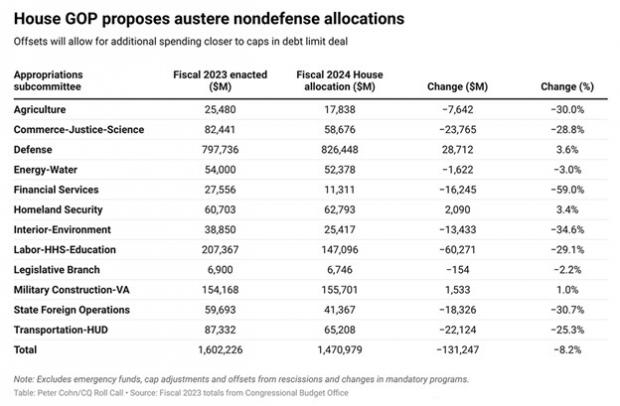House Republicans reached an agreement Monday to end a blockade of legislative action by roughly a dozen far-right lawmakers. In the process, House Speaker Kevin McCarthy may have ensured a more difficult fight later this year over federal spending levels — and may have increased the chances of a government shutdown.
The Republican rebels effectively shut down proceedings on the House floor last week in anger over the deal McCarthy had cut with the White House to suspend the debt limit, and the deal-making process the speaker had used. The GOP hardliners were upset, in part, that the agreement did not cut spending to fiscal year 2022 levels as they had wanted.
Republicans’ lower spending targets: After the hardliners unexpectedly brought House floor proceedings to a halt last week, McCarthy said that he would be open to setting spending levels below the caps in his deal with the White House, enacted into law as the Fiscal Responsibility Act of 2023.
Sure enough, as the full House Appropriations Committee this week begins to work through the 12 annual spending bills, Rep. Kay Granger of Texas, the committee chair, announced Monday that non-defense spending bills would be written below the levels in the debt limit deal — a concession that The Washington Post’s Marianna Sotomayor and Leigh Ann Caldwell call “a clear indication that McCarthy is attempting to appease the far-right rebels.”
“The Fiscal Responsibility Act set a topline spending cap — a ceiling, not a floor — for Fiscal Year 2024 bills,” Granger said in a statement. “That is why I will use this opportunity to mark up appropriations bills that limit new spending to the Fiscal Year 2022 topline level. In addition, by clawing back $115 billion in unnecessary, partisan programs, we will re-focus government spending consistent with Republican priorities, keeping total spending 1% lower than if we were operating under a continuing resolution.”
The subcommittee allocations Granger put forth Monday total $1.471 trillion, which is $119 billion less than the spending caps negotiated by McCarthy and Biden and $131 billion less than the current fiscal year, CQ Roll Call’s Aidan Quigley reports.
“All of those reductions would be on the nondefense side of the ledger, as military and security-related spending would meet the law's $886 billion cap under Granger's plan,” Quigley writes. “Regular nondefense appropriations would face deeper cuts — $159 billion below fiscal 2023 — to make up for the increases to the Pentagon and related accounts. And within nondefense totals, veterans and border security funds would receive slight increases, concentrating the pain on other domestic and foreign aid programs.”
See the CQ Roll Call table below for details about the size of the proposed cuts before any additional offsetting funds.
Clawing back the $115 billion in unspent funds as Granger said she intends to do would bring spending levels back closer to the $1.59 trillion cap in the debt ceiling law, Quigley adds: “Where all of that $115 billion will go hasn't yet been specified. But sources familiar with the planning say it is likely to come from the IRS, EPA, Agriculture Department and other agencies that got hefty increases in the last Congress, which in turn would allow fiscal 2024 additions to bills above their base allocations.”
Why it matters: The spending levels Republicans laid out may raise some hackles among moderates and defense hawks in the GOP — and they certainly will not mesh with the spending levels that Democrats want or will pass out of the Senate. That is likely to make it harder for the House and Senate to agree on the annual spending bills — or, depending on where spending levels end up, it could once again prompt a conservative revolt or result in a government shutdown. The McCarthy-Biden debt limit deal also includes a provision that requires a 1% across-the-board spending cut from fiscal 2023 levels if all 12 appropriations bills aren’t enacted by the end of the year.
Rep. Rosa DeLauro of Connecticut, the top Democrat on the House Appropriations Committee, said Republicans were going back on their deal with Biden. “With the toplines released last night, Republicans are flouting the law of the land. They are disregarding the letter and spirit of the agreement between the president and the speaker of the House,” she said during a markup session Tuesday. She also warned: “If we disregard the law of the land, we all but guarantee a shutdown in October.”
20230613_CQRollCall_302b.jpg






